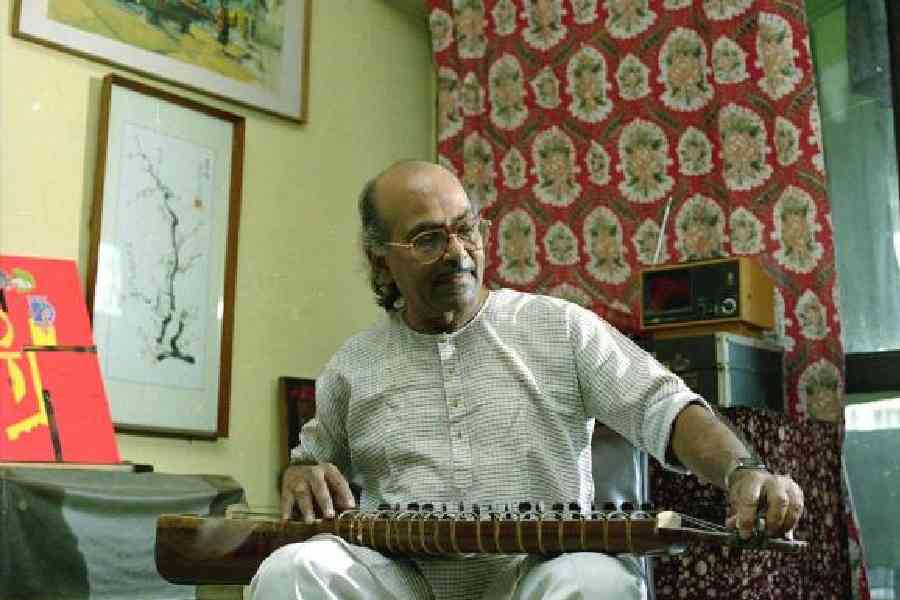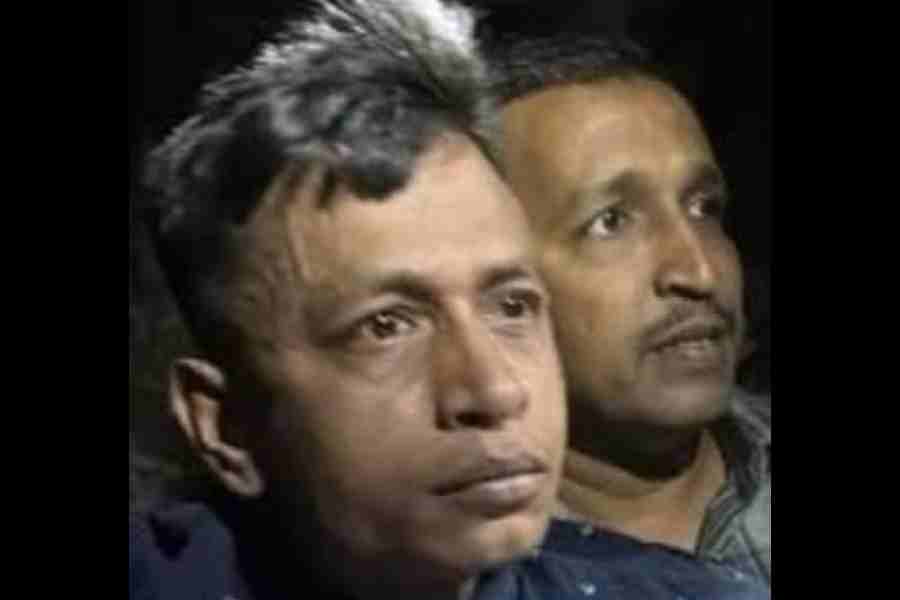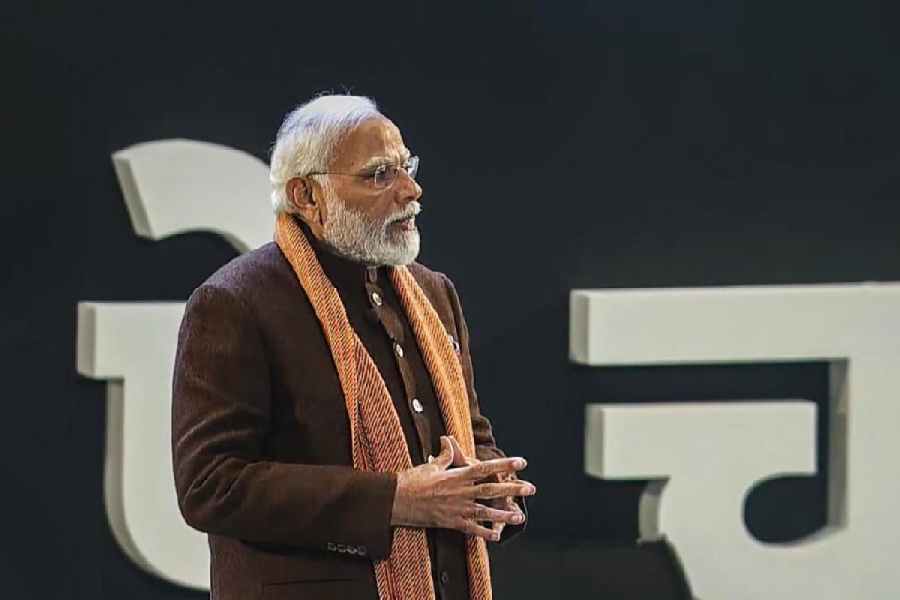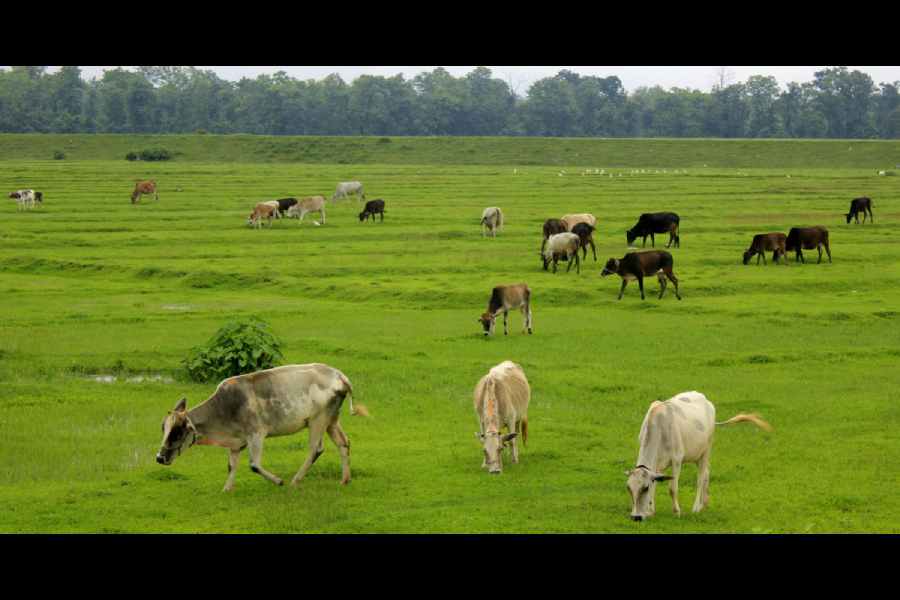Fifty years later, people would undertake research work on my songs,” Salil Chowdhury had predicted in his twilight years. “He knew his music was ahead of his time. In moments of dejection, he would say ekhono toh keu amake patta dilo na (no one has taken me seriously),” daughter Antara Chowdhury recounts.
Salil Chowdhury, whose harmonium keys produced tunes that changed the songscape of the time in Bengal, Bombay and down south, would have turned 99 on Tuesday. Musicians, including some of who have worked with him, like Haimanti Shukla, Kalyan Sen Barat and Rocket Mandal, and from the next generation, like Sriradha Bandyopadhyay, Indrani Sen and Saikat Mitra, would gather at GD Birla Sabhaghar for a four-hour concert in tribute to the music maestro who provided glitter to the golden age of Bengali modern songs.
There is no denying his avant-garde approach to music. “Salilda produced Runner in 1950. Bhaba jaay!” Barat, composer, arranger and the founder of Calcutta Choir, exclaims. The song, originally a Sukanta Bhattacharya poem, was set to tune by Chowdhury in 1946 in response to a postal workers’ movement and released in Hemanta Mukherjee’s Puja album in 1951. “The song broke all norms of contemporary musical tradition. The note Sa changes six times. Yet the transition is so smooth that you cannot feel it!” Runner also stands out in the way it does not come back to the sthayi. “Salilda’s logic for that was a runner goes from one place to another. He does not come back to the same place.”
Together in tribute
Barat is the vice-president of Anandapur Salil Chowdhury Birth Centenary Society, helmed by Goutam Ghose, of which Antara, a resident of Anandapur, is the driving force. The society is playing a musical tribute through a concert on Tuesday evening, featuring 18 top artistes, who will be performing Chowdhury’s songs. “Only Srikantada (Acharya, the secretary) had to leave for a concert abroad. Otherwise, almost the entire fraternity will be there,” Antara says, while watching Lopamudra Mitra and Iman Chakraborty fine-tune their performances at a rehearsal pad in Kasba on Saturday.
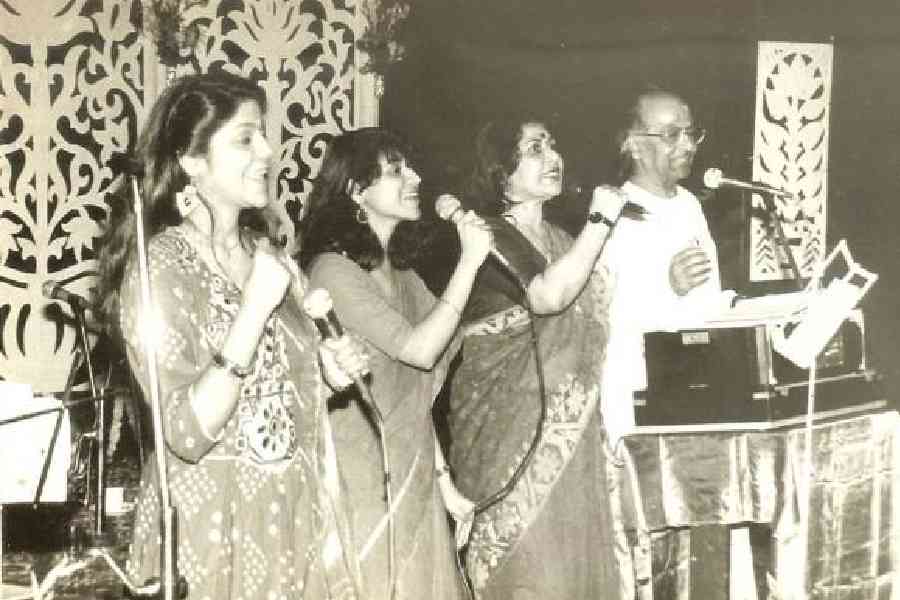
Salil Chowdhury on stage with wife Sabita and daughters Antara (extreme left) and Sanchari
Antara, who came into the limelight singing children’s songs composed by her father, like O Sona Byang or Bulbul pakhi, has made it her mission to preserve and proliferate her father’s works. “My focus has shifted from my own performance to teaching music and protecting his legacy,” she says.
The plan, Barat says, is to celebrate Chowdhury’s centenary over three years. A seminar was held three months ago, analysing his music for connoisseurs. “We are rooting for the term Salilsangeet to gain currency. After Rabindranath Tagore, can you think of any other Bengali composer who has written and set to tune so many songs? Many of Nazrul Islam’s songs have been set to tune by others. If you take into account Salilda’s oeuvre, there would be barely 20 songs which are written by others and set to tune by him, and about half a dozen written by him and set to tune by Hridaynath Mangeshkar,” said Barat.
Antara, he said, was working hard to salvage unpublished works of her father. “She has found poems written on envelopes or on the backs of cigarette packs. Those have been included in the first volume of poems that has been brought out by Dey’s Publishing. We will record the new songs that are found,” Barat said.
There are plans for a Bengali notation book as well as a staff notation book of Chowdhury’s songs where the lyrics will be written in Roman for the benefit of non-Bengali musicians. The notation books will have all the melody and harmony notes along with the chords. Guitarists Satyaban Ukil and Buddhadeb Ganguly, and piano accordion player Tapas Bhaumik are checking the drafts. A new edition of his autobiography, Jiban Ujjiban has come out with some new articles, with the name Jiban Ujjiban Ebong.
Antara dreams of a Salil Chowdhury museum. “I have his harmonium, esraj and keyboard. His personal effects like lungi, kurta, pens, and a pair of spectacles are also there. His awards can also be put on display. Baba had also got a Best Film award from the Uttar Pradesh government for Pinjre Ke Panchhi, his debut film as director.”
A digital archive is also in the works in collaboration with University of Chicago and Victoria Memorial. “They have asked for Baba’s hand-written songs, photographs and important pages of his diary. I am also trying to collate Baba’s articles that got printed in various magazines, including on Lata Mangeshkar, Raj Kapoor and R.D. Burman.”
The second volume of Chowdhury’s collected works is being planned with his plays, short stories, articles, discography and some pages from his diary. “We are also trying to add an unreleased film script,” Antara says.
“My mother and I used to be his music bank. When he would compose for Malayalam films, he would ask us whether he had used a certain tune composed for a Bengali song down south. After checking with us, he turned my mother’s song Pratidin pratikkhon sadharon e jibon from the album Ektu Chup Kore Shono into a Malayalam film song for Yesudas. The tune of Haimanti Shukla’s Eibar swapner bondhon khullam was used in Hindi in a TV serial called Ghar. Kumar Sanu had sung it but it was never telecast,” Antara recalls.
Incidentally, Yesudas, who had come down for a Salil Chowdhury memorial concert at Salt Lake stadium in 2002, has sent a message which will be played at the programme. Messages have also come from Gulzar and composer Shyam from Chennai, who assisted Chowdhury for all his famous Malayalam film albums, starting with the super-hit Chemmeen.
Chowdhury’s son Sanjoy recalls the period between 1967 and 1972 when he used to play harmony chords on the synthesiser in his father’s recording sessions down south. “Ilaiyaraaja played the guitar; A.R. Rahman’s father R.K. Shekhar was the floor coordinator.”
In Chowdhury’s family, all the children needed to learn an instrument. “Flute was my father’s key instrument. He also played the piano, esraj, guitar, tabla, harmonium and keyboard,” says Antara.
Sanjoy, who has scored for 140 films starting with the background score of the Aamir Khan-starrer Sarfarosh, points to the huge body of his father’s background scores. “Baba was a man of orchestration. My grandfather was a tea garden doctor. Baba grew up listening to Assam folk in the garden and Western symphony at home. The music of Madhumati is a flawless mix of those influences,” he says.
But songs were “only 40 per cent” of what Salil Chowdhury did. “Nobody pays attention to his background scores. You will be fascinated if you hear the background music of Anand, Mere Apne, Madhumati, Mausam, Arjun Pandit or Kaala Patthar. The thriller Ittefaq (directed by Yash Chopra and starring Rajesh Khanna) had no songs, yet such was the background score that I have seen appreciative spectators throw coins at the screen at Lotus cinema in Bombay’s Haji Ali where the film was running,” said Sanjoy, who himself got a Special Mention at the 2024 National Awards for the music of the Malayalam film Kaadhikan. Sanjoy will be coordinating backstage in Tuesday’s show.
The weekend saw the artistes attend extensive rehearsals with musicians and Calcutta Choir singers for the GD Birla Sabhaghar concert. Antara would be singing a couple of her hits for children, Bulbul pakhi and Na dir dir, with students of her music school Suroddhwoni. Another sibling, Tulika Mukherjee (the second daughter from Chowdhury’s first wife Jyoti) is also coming over from Kurseong.
“Salil Chowdhury is a nostalgia for all of us. I had received a prize from him when he was judging a contest at the state Sangeet Akademi in the early ‘90s. It was an honour to have got a chance to sing in his presence just as it will be to take part in his centenary celebration,” Lopamudra sums up.

